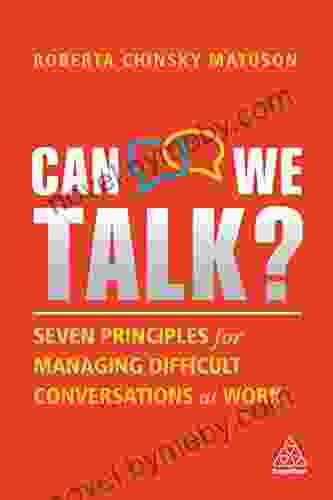Mastering Difficult Conversations: A Guide to Navigating Workplace Challenges with Confidence

4.7 out of 5
| Language | : | English |
| File size | : | 1142 KB |
| Text-to-Speech | : | Enabled |
| Screen Reader | : | Supported |
| Enhanced typesetting | : | Enabled |
| Word Wise | : | Enabled |
| Print length | : | 220 pages |
Effective communication is crucial for success in any workplace. However, engaging in difficult conversations can be daunting, often leading to stress, anxiety, and avoidance. These conversations can involve sensitive topics, conflicts, or workplace issues that require careful handling.
The inability to effectively manage difficult conversations can have severe consequences, including damaged relationships, decreased productivity, and a negative work environment. However, with the right strategies and techniques, individuals can confidently approach and navigate these conversations, fostering open communication and building stronger relationships.
The Seven Principles for Managing Difficult Conversations
This comprehensive guide provides a framework of seven principles for managing difficult conversations at work:
1. Prepare and Plan
Thoroughly prepare for the conversation by gathering relevant information, identifying your objectives, and anticipating potential roadblocks. Plan the appropriate time and location, ensuring privacy and minimizing distractions.
2. Establish a Positive Mindset
Approach the conversation with a positive and solution-oriented mindset. Avoid accusatory language or blaming others. Instead, focus on understanding the other person's perspective and collaborating to find mutually acceptable solutions.
3. Listen Actively and Seek to Understand
Practice active listening by paying full attention to what the other person is saying, both verbally and nonverbally. Ask clarifying questions to demonstrate understanding and show that you value their perspective.
4. Express Yourself Clearly and Respectfully
Communicate your thoughts and feelings clearly and respectfully, using "I" statements to express your own perspective. Be mindful of your tone of voice and body language, and avoid interrupting or talking over the other person.
5. Navigate Conflict Constructively
Acknowledge and address conflicts directly, but do so in a constructive manner. Focus on the issue at hand, rather than making personal attacks. Seek common ground and work towards finding solutions that address the needs of both parties.
6. Seek Support When Needed
If necessary, seek support from a trusted colleague, mentor, or HR representative. They can provide an objective perspective, facilitate communication, and help to resolve the situation.
7. Follow Up and Reflect
After the conversation, take time to reflect on what went well and what could be improved. Document any agreements or decisions made, and follow up as needed. This will ensure accountability and strengthen the relationship over time.
Benefits of Mastering Difficult Conversations
Mastering difficult conversations brings numerous benefits to individuals and organizations, including:
- Improved communication and interpersonal skills
- Increased productivity and efficiency
- Enhanced teamwork and collaboration
- Reduced stress and anxiety
- Strengthened relationships and trust
- Positive and supportive work environment
Engaging in difficult conversations is an essential aspect of effective workplace communication. By embracing the seven principles outlined in this guide, individuals can confidently navigate these conversations, fostering open communication, building stronger relationships, and creating a positive and productive work environment.
Mastering difficult conversations is an ongoing journey that requires practice, patience, and a commitment to personal and professional growth. With dedication and perseverance, individuals can develop the skills and confidence necessary to successfully manage even the most challenging conversations at work.
4.7 out of 5
| Language | : | English |
| File size | : | 1142 KB |
| Text-to-Speech | : | Enabled |
| Screen Reader | : | Supported |
| Enhanced typesetting | : | Enabled |
| Word Wise | : | Enabled |
| Print length | : | 220 pages |
Do you want to contribute by writing guest posts on this blog?
Please contact us and send us a resume of previous articles that you have written.
 Book
Book Novel
Novel Page
Page Chapter
Chapter Text
Text Story
Story Genre
Genre Reader
Reader Library
Library Paperback
Paperback E-book
E-book Magazine
Magazine Newspaper
Newspaper Paragraph
Paragraph Sentence
Sentence Bookmark
Bookmark Shelf
Shelf Glossary
Glossary Bibliography
Bibliography Foreword
Foreword Preface
Preface Synopsis
Synopsis Annotation
Annotation Footnote
Footnote Manuscript
Manuscript Scroll
Scroll Codex
Codex Tome
Tome Bestseller
Bestseller Classics
Classics Library card
Library card Narrative
Narrative Biography
Biography Autobiography
Autobiography Memoir
Memoir Reference
Reference Encyclopedia
Encyclopedia Randy Shilts
Randy Shilts Rowan Ellis
Rowan Ellis Richard Ives
Richard Ives Russell Freedman
Russell Freedman Richard Streatfeild
Richard Streatfeild Riley Black
Riley Black Richard Wentworth
Richard Wentworth Robert G Hagstrom
Robert G Hagstrom Ray T Malbrough
Ray T Malbrough Ryan Mccombs Jr
Ryan Mccombs Jr Qaiser Feroze
Qaiser Feroze Richard Freeman
Richard Freeman Ruby Boukabou
Ruby Boukabou Rami Yelda
Rami Yelda Harold Arlen
Harold Arlen Simran Bansal
Simran Bansal Wendy Bradshaw
Wendy Bradshaw Yang Kuang
Yang Kuang Robert Moor
Robert Moor Rinku Sen
Rinku Sen
Light bulbAdvertise smarter! Our strategic ad space ensures maximum exposure. Reserve your spot today!

 Milton BellUnveil the Enigmatic World of the Phoenicians: A Literary Journey with "The...
Milton BellUnveil the Enigmatic World of the Phoenicians: A Literary Journey with "The...
 Arthur Conan DoyleMaster the Craft of Product Management: The Product Manager Desk Reference...
Arthur Conan DoyleMaster the Craft of Product Management: The Product Manager Desk Reference... Albert CamusFollow ·8.2k
Albert CamusFollow ·8.2k Jayson PowellFollow ·14k
Jayson PowellFollow ·14k Clark CampbellFollow ·12.1k
Clark CampbellFollow ·12.1k Eddie PowellFollow ·7k
Eddie PowellFollow ·7k Derek CookFollow ·2.4k
Derek CookFollow ·2.4k Dylan HayesFollow ·16.7k
Dylan HayesFollow ·16.7k Garrett PowellFollow ·19.4k
Garrett PowellFollow ·19.4k Ernest HemingwayFollow ·19.8k
Ernest HemingwayFollow ·19.8k

 Mike Hayes
Mike HayesArthur Meighen: A Life in Politics
Arthur Meighen was one of Canada's most...

 Bryan Gray
Bryan GrayVindicated: Atlanta's Finest
In the heart of Atlanta, a...

 Houston Powell
Houston PowellHis to Defend: A Captivating Legal Thriller That Will...
An Unforgettable...

 John Green
John GreenUncover the Riveting Tale of "Hunted: Atlanta Finest" - A...
Prepare yourself for a...
4.7 out of 5
| Language | : | English |
| File size | : | 1142 KB |
| Text-to-Speech | : | Enabled |
| Screen Reader | : | Supported |
| Enhanced typesetting | : | Enabled |
| Word Wise | : | Enabled |
| Print length | : | 220 pages |











